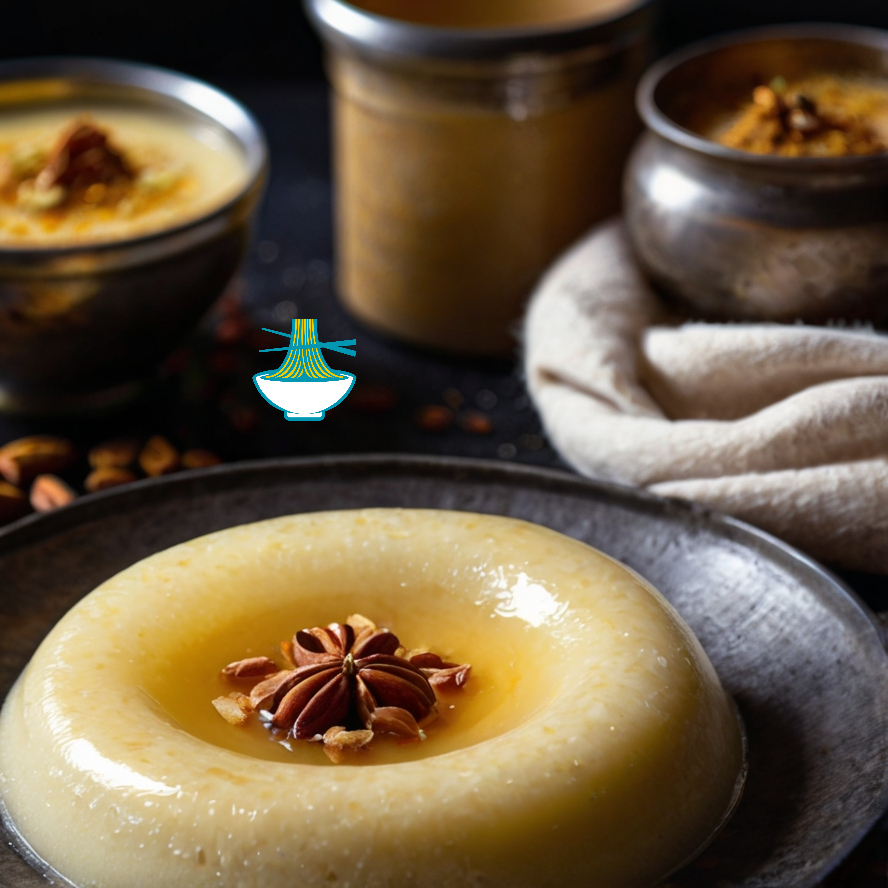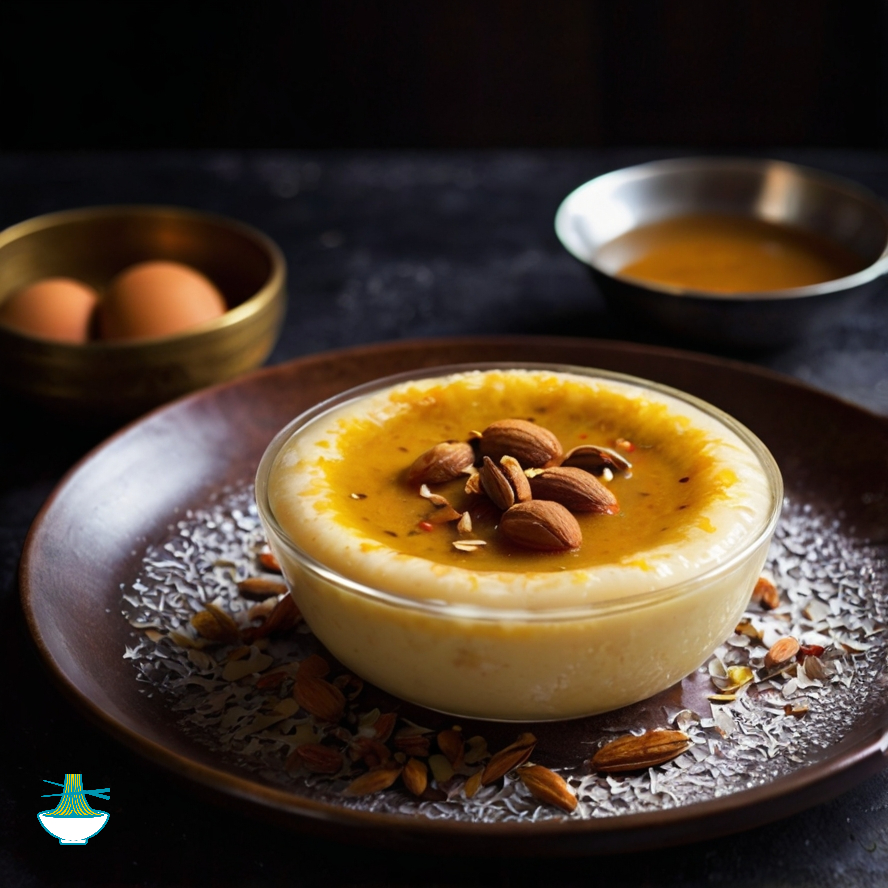Watalappam,a beloved dessert from Sri Lanka, is a sweet custard-like delicacy made with coconut milk,jaggery (palm sugar), eggs, and a blend of aromatic spices.
Its roots trace back to South Indian cuisine, particularly among the Malayali community, and it's often enjoyed during festive occasions and celebrations. The creamy texture, combined with the rich flavors of coconut and jaggery, makes watalappam a cherished treat that has transcended cultural boundaries and delighted taste buds for generations.
Ingredients :
- 400ml coconut milk
- 150g jaggery (or palm sugar)
- 4 eggs
- 1/2 tsp cardamom powder
- 1/4 tsp nutmeg powder
- A pinch of salt
Method:
1. Preheat your oven to 160°C (320°F).
2. In a saucepan, heat the coconut milk and jaggery over medium heat until the jaggery dissolves completely. Allow the mixture to cool slightly.
3. In a mixing bowl, beat the eggs well.
4. Gradually add the cooled coconut milk mixture to the beaten eggs, stirring continuously.
5. Add the cardamom powder, nutmeg powder, and a pinch of salt to the mixture. Stir until well combined.
6. Strain the mixture through a fine sieve to remove any lumps.
7. Pour the strained mixture into individual ramekins or a baking dish.
8. Place the ramekins or baking dish in a larger pan filled with hot water to create a water bath.
9. Bake in the preheated oven for about 45-50 minutes, or until the custard is set and slightly golden on top.
10. Once baked, remove from the oven and allow to cool completely before serving.
11. Serve chilled or at room temperature, garnished with toasted coconut flakes or chopped nuts if desired. Enjoy your delicious homemade Watalappam!
Nutrition Value:
1. Coconut Milk (400ml):
- Calories: Approximately 960 kcal
- Carbohydrates: Around 16g
- Protein: About 8g
- Fat: Roughly 100g
- Sodium: Varies depending on brand, typically minimal
- Cholesterol: Zero (Coconut milk is cholesterol-free)
- Vitamins: Contains vitamins C, E, B1, B3, B5, and B6
- Minerals: Rich in manganese, copper, iron, magnesium, phosphorus, potassium, and zinc
- Nutritional Benefit: Coconut milk provides healthy fats, essential nutrients, and medium-chain triglycerides (MCTs) which may offer various health benefits, including improved heart health and digestion.
2. Jaggery (150g):
- Calories: Approximately 576 kcal
- Carbohydrates: Around 150g
- Protein: Negligible
- Fat: Negligible
- Sodium: Minimal
- Cholesterol: Zero
- Vitamins: Contains small amounts of vitamin B complex and vitamin C
- Minerals: Rich in iron, magnesium, potassium, and calcium
- Nutritional Benefit: Jaggery is a natural sweetener made from sugarcane juice and retains some of its vitamins and minerals. It's considered healthier than refined sugar due to its minimal processing and nutrient content.
3. Eggs (4 large eggs):
- Calories: Approximately 280 kcal
- Carbohydrates: Around 1.6g
- Protein: About 24g
- Fat: Roughly 20g
- Sodium: Around 280mg
- Cholesterol: Approximately 840mg
- Vitamins: Rich in vitamins A, D, E, K, B2, B6, B12, and folate
- Minerals: Contains iron, zinc, selenium, and phosphorus
- Nutritional Benefit: Eggs are a complete protein source and contain essential nutrients important for overall health, including brain function, muscle development, and eye health.
4. Cardamom Powder (1/2 tsp):
- Calories: Approximately 6 kcal
- Carbohydrates: Around 1.3g
- Protein: Negligible
- Fat: Negligible
- Sodium: Minimal
- Cholesterol: Zero
- Vitamins: Contains small amounts of vitamin C
- Minerals: Rich in potassium, calcium, and magnesium
- Nutritional Benefit: Cardamom is known for its antioxidant properties and may help improve digestion, reduce inflammation, and freshen breath.
5. Nutmeg Powder (1/4 tsp):
- Calories: Approximately 6 kcal
- Carbohydrates: Around 0.6g
- Protein: Negligible
- Fat: Negligible
- Sodium: Minimal
- Cholesterol: Zero
- Vitamins: Contains small amounts of vitamin A, vitamin C, and vitamin E
- Minerals: Rich in manganese, copper, and magnesium
- Nutritional Benefit: Nutmeg is a spice with antimicrobial and anti-inflammatory properties. It may also aid in digestion and promote better sleep.
6. Salt (A pinch):
- Calories: Zero
- Carbohydrates: Zero
- Protein: Zero
- Fat: Zero
- Sodium: Varies depending on the amount, typically less than 1mg
- Cholesterol: Zero
- Vitamins: Zero
- Minerals: Primarily sodium chloride
- Nutritional Benefit: While salt itself doesn't provide nutrients, it enhances the flavor of food and is essential for maintaining electrolyte balance in the body. However, excessive consumption can lead to health problems such as high blood pressure. Moderation is key.


Comments